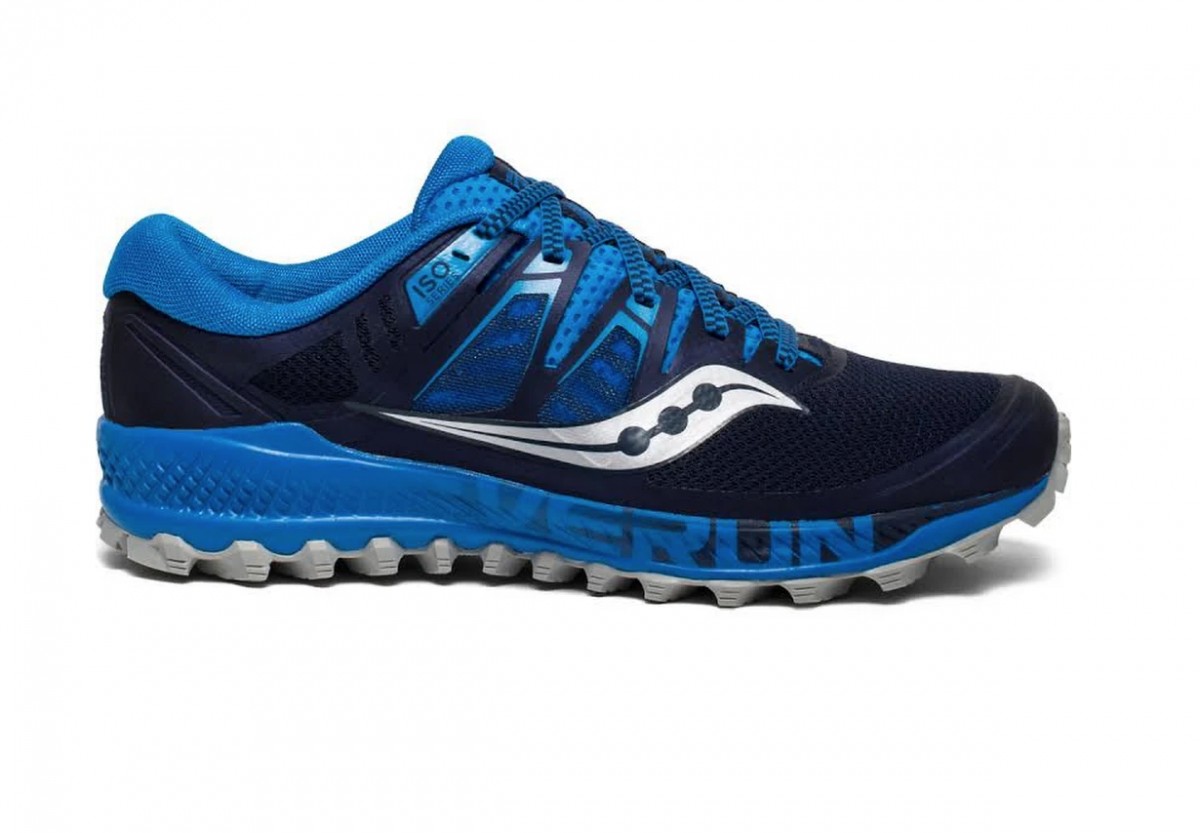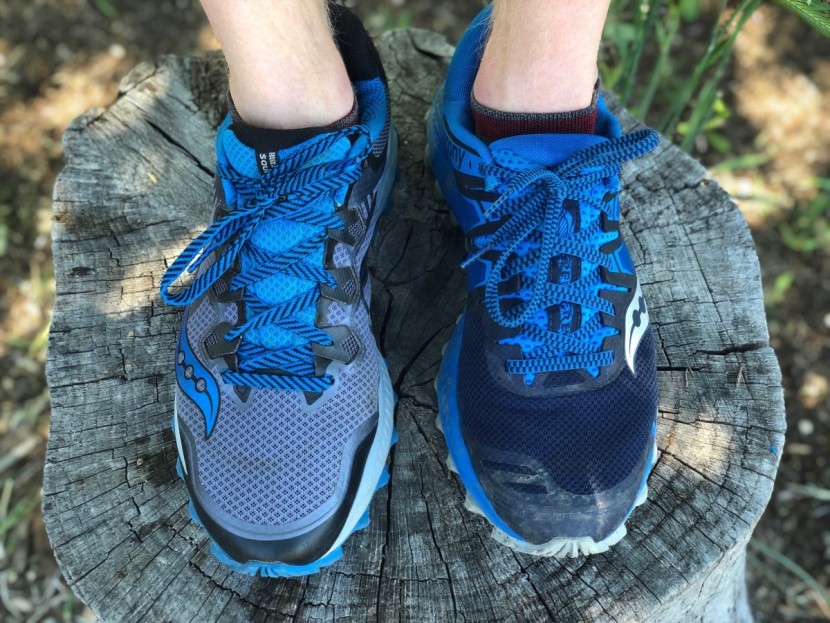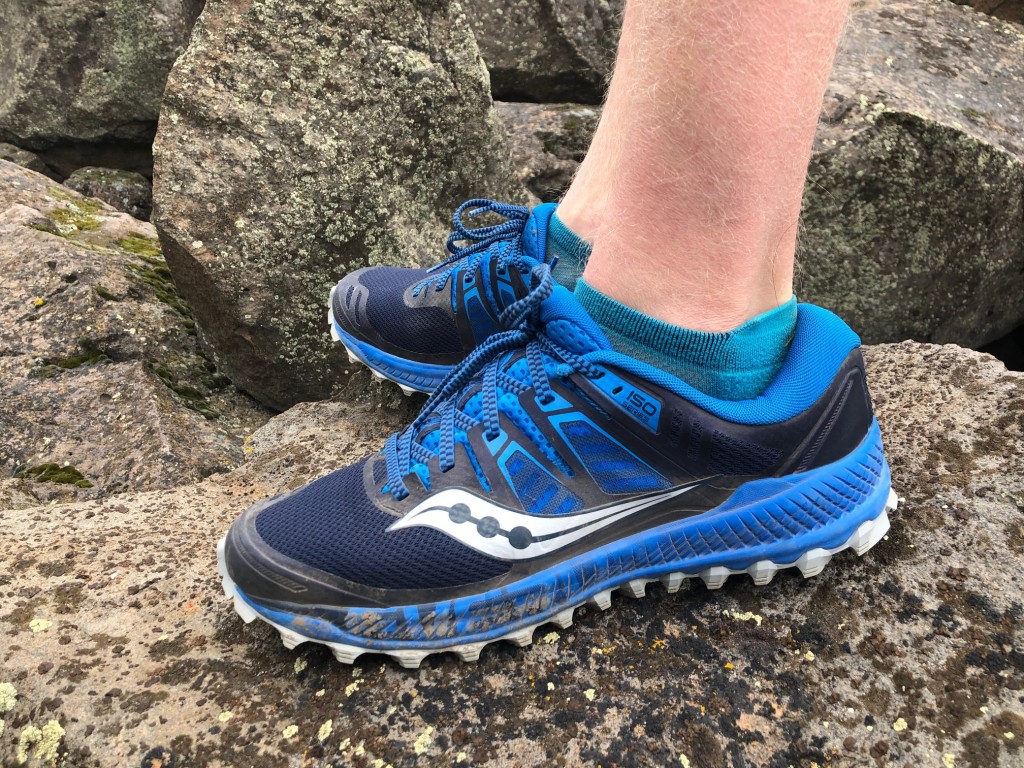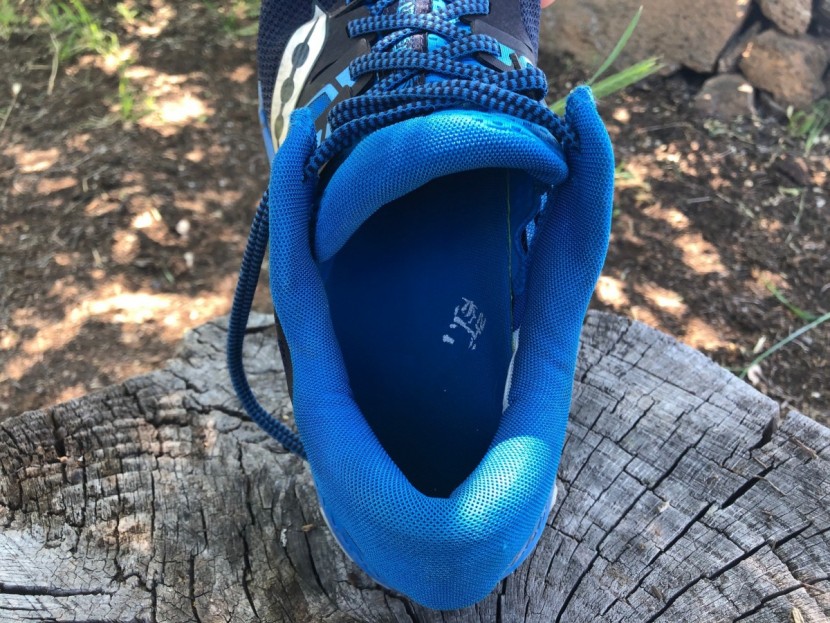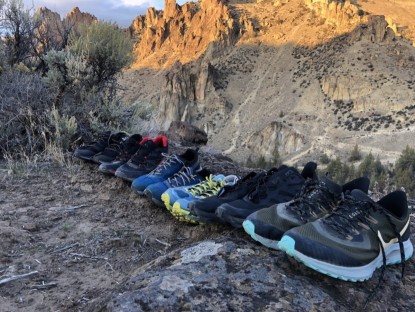Saucony Peregrine ISO Review
Our Verdict
Our Analysis and Test Results
The Peregrine ISO is in many ways similar to the 2018 version of the Peregrine 8, with a few key changes to the upper that add considerably to overall comfort. The underfoot combination of soft foam cushioning and shock absorption, combined with the multi-directional lugged outsole remains the same. The ISO uses Saucony's new ISOFIT upper, which they have incorporated into many shoes in their line. This upper uses a padded and gusseted tongue to wrap the midfoot, while the laces lock the foot firmly in place in conjunction with multiple detached “wings,” not dissimilar to the design concept of the Salomon S/Lab Ultra 2.
The most immediately noticeable change from previous versions is the huge amount of cushioning surrounding the ankle opening and over the Achilles tendon region of the heel, while the very annoying, blister-causing sewn seams that rested over the heel cup in the previous couple versions have thankfully been wholly eliminated. When you put this shoe on, it immediately feels remarkably comfortable and not too different from the last version, and it retains this level of comfort throughout the first and many runs after that.
Foot Protection
Over the years, the Peregrine has slowly morphed into one of the softest shoes underfoot that you can buy. It uses a layer of squishy foam in the midsole that feels very similar to the foam compound found in the Altra Lone Peak 4, giving you a bit of rebound springiness when you run. While this foam layer does a decent job absorbing the inherent impacts from running, it does a pretty poor job of absorbing direct blows to the feet that come from rocks and roots. You will feel the rocks that you are stepping on, which can be nice and liberating in certain circumstances but is a bit of a deterrent for runs on especially rocky trails, or for ultra distances. Stiff midsoles, like the one in the Scarpa Spin Ultra, do a better job of handling these types of terrain.
The Peregrine ISO also lacks an overly protective upper. Made of the standard lightweight mesh, it lacks the durable TPU overlays in the creases of the forefoot where the most wear and tear takes place. We also noticed that the gaps between the “wings” allow dirt and dust to filter into the inside of the shoe easier than most, as does the extra amount of padding around the ankle. Consider pairing them with trail gaiters.
Traction
The crazy looking lug pattern of the PWRTRAC outsole on the Peregrine ISO provides some of the best traction that you can buy in a trail running shoe. The bottom looks like a waffle-iron, but with much deeper and sharper lugs than the waffle patterned outsole found on the Nike Wildhorse 5. These lugs do an amazing job of gripping soft surfaces like grass and snow, and also work great on regular dirt trails.
Our comparative testing also found this outsole to be relatively soft and sticky, giving us good purchase on rock. That said, the large, soft rubber lugs have a propensity to rip off prematurely if you do too much scrambling in them, and the soft foam midsole doesn't absorb the blows of running over rocks very well. We liked the La Sportiva Kaptiva better for missions where lots of rocks or scrambling were a guarantee, but love these shoes for grassy tundra and running in the slippery snow of shoulder seasons.
Stability
These are a very stable shoe, as they tick many of the boxes that ensure a solid, well-balanced landing and takeoff. With only 18.5mm of stack height under the forefoot, they ride low to the ground, and the low 4mm heel-toe drop is noticeably more stable when compared directly to a shoe with an 8mm drop, or greater, like the high-heeled Salomon Speedcross 5. Furthermore, the upper does a good job of holding the foot securely in place without allowing for internal slop, and the opening around the ankle and heel is supremely comfortable when traversing across hillsides.
The only knock when it comes to stability is how supple the shoe is. We generally find that stiffer lasted shoes enable the foot to take off from a flatter platform more consistently, while easily bendable shoes mold themselves to the shape of the ground, sometimes at the expense of take-off stability. This is a minor complaint, however, and we feel this shoe does a great job of mitigating ankle-rolling risk.
Comfort
What an unbelievably comfortable shoe! This is the first thing you will notice when you slip it on your foot, and the greatest sales pitch a shoe could have. Simply put, we have a hard time remembering another shoe that felt so plush and comfy the moment we put it on. If that isn't enough to make it worth a try, we don't know what is.
The fit of this shoe is average, with it feeling true to size, and not feeling too wide or too narrow. Those with extra wide feet will be happy to hear that Saucony is now making this shoe in a wide version as well!
Weight
Our pair of size 11 shoes weighed in at 23.1 ounces on our independent scale. This is 0.6 ounces lighter than a pair of the Peregrine 8, so like most trail running shoes these days, they are managing to find ways to make them lighter.
Despite shaving the grams year to year, these shoes are still one of the heavier options in this review, weighing in at four ounces heavier than the similarly sensitive Altra Superior 4, and a shade heavier than the Salomon S/Lab Ultra 2, which feel significantly burlier. Anecdotally, they do not feel like a heavy or clunky shoe while running in them.
Sensitivity
The Peregrine ISO is one of the most sensitive trail running shoes we tested, especially among the non-lightweight options. While super thin and minimalist shoes like the Adidas Terrex Speed or the Hoka Evo Jawz are super sensitive due to their almost non-existent midsole, shoes with thicker midsoles typically dampen the trail feel a bit. Not so with these shoes, which are balanced more towards sensitivity than they are towards foot protection.
The underfoot foam of these shoes allows a lot of feeling to come through to the sole of the foot. Run on smooth trails without too many rocks, and this feeling is a revelation, and much appreciated. However, spend your days scree hopping or picking through boulder fields, and you may feel like your feet are taking more of a beating than they should. Additionally, it has been our experience that the soft foam in these shoes compresses out over time as you wear them more and more, and as this happens they become even thinner, and a bit more sensitive.
Best Applications
With their aggressive and sticky traction, we feel these shoes are ideal for seasons or terrain where avoiding slipping is a primary concern. Grassy, snowy, muddy conditions are where this shoe will thrive. It also handles dirt trail with ease, and can stick to rock no problem, but wears out quicker. We like these shoes better for smoother trails that may be slippery and choose something else if we are spending the whole day running over rocks.
Value
At $120, these shoes are by no means a steal, but in an era where the price of trail running shoes seems to be escalating quickly, they offer high performance for a price that has long been standard. Since they are one of the top-performing trail running shoes in our testing, we think they are a good value and a worthy choice for our Best Bang for the Buck Award.
Conclusion
The Saucony Peregrine ISO is our Best Bang for the Buck winners because they offer great value. They are an extremely comfortable shoe, offering great traction, awesome stability, and a sensitive feel for the trail. They are a bit light on foot protection and weigh more than most, but for those who value comfort, make a great choice.


